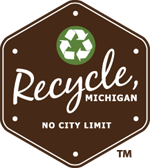Yard Debris & Other Organics
The largest waste stream in Michigan making up 38% of landfilled materials, is organic and compostable material. In 1995 Michigan passed a law to prohibit the disposal of yard debris in landfills. Today, yard waste accounts for just 9% of organics disposed of in landfills, while the rest is mostly food waste.
When organic materials such as yard debris and food scraps are added to the oxygen-deprived environment of a landfill, those materials break down and contribute to the release of harmful greenhouse gasses. Additionally, organic materials contain valuable nutrients that go to waste in a landfill instead of being used to replenish Michigan soils.
Many communities collect yard debris for composting at the curb or designated drop-off sites. A limited number of communities are also beginning to consider adding food scraps to yard debris collection programs. Call your local recycling contact to learn about yard debris and other organic management in your community or find the List of EGLE Registered Composting Facilities here.
Composting yard debris and food scraps in your backyard is another rewarding and environmentally sustainable activity that any Michigan household can start. When we compost at home, we take a powerful action to reduce our trash, mitigate climate change, and amend our soil to improve home gardening, mitigate improper water drainage, and improve the overall yard and soil health. Great resources for learning more about how to start your composting at home journey include the Earth Easy backyard composting guide and the EPA’s Preventing Wasted Food At Home resource and guide.

